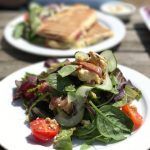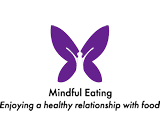Weight Control With No Dieting

We have to make multiple food choices every day, and navigating successfully around the food environment is a skill in itself. Most of us are confronted daily by delicious-looking, cheap and easy to prepare foods, so we’re never far from temptation. Eating ‘well’ isn’t just about eating nutritious foods- it’s also about having a good relationship with food, and an ability to make healthier, more balanced, satisfying and non guilt-ridden food choices most of the time is a reflection of a good relationship with food.
Successful weight control isn’t about knowing the calories in foods and being able to always say no to the ‘bad’ foods- it’s about being in tune with your body’s needs, giving yourself permission to eat the foods you enjoy whilst eating them mindfully, and creating a personalised way of eating that suits you and fits in with your lifestyle and taste preferences. There is no ‘rule book’ or perfect way of eating, yet many people I’ve met feel that they’re never achieving ‘right’, or a certain standard of eating- this can cause them to feel a sense of failure, and following a diet plan or having a medical procedure can seem to them the only way to control and be ‘good’ around food. But at the same time they battle with inner conflict as they don’t want to go on another diet because diets have never given them long-term results. Successful weight control is also about being able to eat in balance (a ‘middle-way’ approach), not swinging between extremes (the all-or-nothing mindset is very common- see below).
There’s No Point In Trying To Lose Weight If You Have A Poor Relationship With Food: Address That First, Or Alongside
If you feel that your eating habits could do with some improvement, self-awareness is the key to change. By becoming more aware of what, how and why you eat, including your eating triggers, you can start to address mindless eating or comfort eating. Some people naturally eat very quickly; others eat on the go because they see food as simply functional, a way to fuel up. Other people turn to food as a coping mechanism, and they might find that they’re thinking about food all the time. Food can symbolise different things to different people, whether it’s a way to relax or have a break, a means of calming down, distracting or numbing oneself when things feel difficult or overwhelming; it can be a way to reward oneself, let go or decompress, a way to put things off (procrastinate), and eating can even be a means of rebelling or rule-breaking. Food might be used to self-soothe or self-punish.
Many people have had little opportunity to address their relationship with food- or perhaps they’re fearful of exploring their relationship with food. Food coaching can help people to build self-awareness and self-insight, enabling them to identify why they might regularly overeat or make poor food choices, and then they’re able to find strategies to help them improve their relationship with food. For those with a strong inner critic, once they start to understand themselves a bit better they’re able to start being more self-compassionate, and they feel more empowered and motivated because they finally understand the whys. Importantly, a lack of self-belief might need addressing, especially if a person has a long history of failed diet attempts (yo-yo dieting).
“Quite honestly I feel like a different person because of the way Emma has helped me to feel more free around food and eating”.
The Problem With Diets
 If a diet plan gives you generic guidelines about what and how much to eat, this can prevent you from thinking for yourself and connecting with which meals and snacks are best for you, and what portion sizes are right for you. Although clear guidelines can be helpful, such diet plans and accompanying advice don’t tend to include exploring a person’s relationship with food. The individual might also try to ignore feelings of hunger if they’ve eaten the ‘prescribed’ amount of food, feeling that they’re not allowed any more food- but getting into a habit of ignoring the body’s signals can cause disconnect between mind and body. Years of dieting can dampen the hunger signal, if a person has ignored their body’s hunger cues, and they might not even know when it’s time to eat.
If a diet plan gives you generic guidelines about what and how much to eat, this can prevent you from thinking for yourself and connecting with which meals and snacks are best for you, and what portion sizes are right for you. Although clear guidelines can be helpful, such diet plans and accompanying advice don’t tend to include exploring a person’s relationship with food. The individual might also try to ignore feelings of hunger if they’ve eaten the ‘prescribed’ amount of food, feeling that they’re not allowed any more food- but getting into a habit of ignoring the body’s signals can cause disconnect between mind and body. Years of dieting can dampen the hunger signal, if a person has ignored their body’s hunger cues, and they might not even know when it’s time to eat.
Learning to identify which foods/food combinations and amounts of foods are satiating for you, helping you to avoid blood sugar peaks and dips and frequent hunger is a key part of appetite control and weight control. Understanding blood sugar balance is an important part of weight loss and long-term weight control. Snacking isn’t ‘bad’, but a lot of people feel guilty about eating between meals; yet snacking can help to stabilise blood sugar levels between meals, if it’s the type of snack that provides the nutrients to make it a sustaining snack.
Fear Of Hunger
A key thing to be aware of is whether a person dislikes the feeling of being hungry. The moment they feel the slightest sensation of hunger, they might reach for food, to the point that they’re grazing all day. Hunger is a normal experience, and our ancestors would have experienced it regularly, not having access to food all round the clock. It’s therefore a good mindful eating practice to enable yourself to sit with hunger for just a little while (even if it’s just 10 minutes), otherwise if a person doesn’t ever allow themselves to get hungry, it can mean that they’re eating too much for their body’s needs, which can also stall weight loss. If you feel hungry, it is of course a signal from the body telling you it’s time to eat, and it’s a good idea to eat something at that point, rather than skipping meals or starving yourself, which can also have a very negative impact on any weight loss attempts. Listen to your body, not a diet plan.
All-Or-Nothing Thinking And Behaviours
Being ‘on’ or ‘off’ a diet can also encourage an all-or-nothing mindset of either being ‘good’ (on the diet) or ‘bad’ (off the diet); you might assess your eating as either ‘success’ or ‘failure’. Read my blog post: ‘Stop Yo-Yo Dieting With Middle-Way Eating’. If it helps you to follow your own rules or ‘personal guidelines’, then incorporate these into a flexible, enjoyable personalised plan of your own, rather than following someone else’s rules. Going on diets can also encourage an obsession with the weighing scales, when in fact a person’s priority might be to improve their relationship with food- weight loss can then be a positive by-product. Avoid going on diet plans where whole food groups are cut out, or where your favourite foods are forbidden or significantly limited- instead, learn to mindfully eat the foods you love in moderate amounts so that you don’t end up craving them or feeling guilty when you eat them. If you can stop relying on diets to control your eating you’ll feel much more liberated and empowered.
“One of the biggest realisations was the detrimental effect that years of trying different diets had had on my relationship with food”.
Don’t Be Scales Obsessed
 I meet people who weigh themselves daily. Sometimes this is because they don’t trust themselves around food and they feel they need to constantly keep an eye on their weight for fear of weight gain. Similarly when people want to lose weight and start a diet, they can get fixated on the weighing scales. It’s good to have a goal, but people tend to rely purely on willpower to eat less and lose weight- yet willpower alone just isn’t enough. If a person is an emotional eater they might be really focused on how much weight they’re losing for a time, but if they tend to rely on food to ‘cope’, it’s unlikely that they’ll keep losing weight for more than a few weeks, or even days. It can be very motivating when weight loss occurs, but it can also be very disheartening when the scales isn’t showing weight loss, perhaps because a person isn’t sticking to the diet. It’s really important to explore your relationship with food and address any problematic eating habits first, or alongside, a weight loss goal- and address your relationship with the weighing scales too. If you want to weigh yourself, then once a week maximum is a good approach.
I meet people who weigh themselves daily. Sometimes this is because they don’t trust themselves around food and they feel they need to constantly keep an eye on their weight for fear of weight gain. Similarly when people want to lose weight and start a diet, they can get fixated on the weighing scales. It’s good to have a goal, but people tend to rely purely on willpower to eat less and lose weight- yet willpower alone just isn’t enough. If a person is an emotional eater they might be really focused on how much weight they’re losing for a time, but if they tend to rely on food to ‘cope’, it’s unlikely that they’ll keep losing weight for more than a few weeks, or even days. It can be very motivating when weight loss occurs, but it can also be very disheartening when the scales isn’t showing weight loss, perhaps because a person isn’t sticking to the diet. It’s really important to explore your relationship with food and address any problematic eating habits first, or alongside, a weight loss goal- and address your relationship with the weighing scales too. If you want to weigh yourself, then once a week maximum is a good approach.
Steadier Weight Loss Means More Flexibility
In our ‘quick fix’ society of instant gratification many people are impatient to lose weight, particularly if they’ve lost weight quickly in the past on a rapid weight loss plan. In addition, some might feel that in order to control their eating they need to be on a restrictive diet because they don’t trust themselves around food. By abandoning the dieting mindset and instead focusing on long-term behaviour change, it’s possible to break free from yo-yo dieting. Small, consistent changes is a good starting point- there’s no point following an eating plan perfectly for a couple of weeks and then reverting back to old eating habits. If something isn’t difficult, it’s enjoyable and fits into your lifestyle, you’re more likely to be consistent. After some time, the new habits you’ve practised can then become second nature. It’s better to make smaller but achievable changes and have slower weight loss than it is to lose weight quickly without embedding new eating habits. Choice and permission around food is important too, and a flexible, less all-or-nothing approach to food. It’s better to have fewer food rules and more flexibility and choice- even if this means slower weight loss, you’ll be eating in a way that’s easier to maintain for the long-term.
Knowledge is Power: Empowering You To Transform Your Eating
When people gain more knowledge about food and nutrition and awareness of their own eating patterns,  they have a better chance of adopting new eating habits. If they’re more aware of their own personal challenges when it comes to eating, they can then focus on those areas and develop the relevant strategies and skills required to help them feel more in charge of food.
they have a better chance of adopting new eating habits. If they’re more aware of their own personal challenges when it comes to eating, they can then focus on those areas and develop the relevant strategies and skills required to help them feel more in charge of food.
Once clients have an understanding of how their bodies physically respond to certain foods, they’re able to recognise that how they eat is not driven simply by their thoughts and feelings, which could cause the client to label themselves as having no willpower, but also by physiological processes taking place in the body which can influence hunger, cravings and mood (I call it the Hormone Factor). They can then choose the appropriate foods to help them feel fuller for longer and more in control of their appetite (blood sugar control), as well as being aware of the impact of stressful living, and how this can affect appetite and weight too. Lifestyle management is an equally important part of eating management.
Gaining knowledge, skills and self-insight is empowering and can really encourage a ‘can do’ attitude and build self-belief, which in turn can provide the foundation and motivation for creating new habits.
“Emma has helped me so much with understanding my relationship with food.”
Deconstructing Habits
Habits don’t change overnight- it requires experimenting, practice, dedication and patience. I work with clients to motivate and inspire them, to set up new habits they feel are manageable, enjoyable and sustainable, and to help them feel more in charge of their eating without feeling the need to be on a strict diet. Once they’re more in control of their eating, they find that weight loss follows naturally.
My approach to helping people improve their relationship with food and lose weight involves encouraging them to do some self-reflection and look at their current eating and lifestyle habits. In order to ‘de-construct’ unhelpful habits and build more helpful ones, it requires people to become more aware of what, how and why they eat, and to address their mindset. I can work with you to help you create new habits, which relies on first addressing any unhelpful thought processes, values or belief systems which may be negatively influencing your relationship with food.
“Emma suggested small (and often easy) adjustments to my daily habits to help me be more mindful of my eating and start to see food as a friend and not foe”.
Engaging The Brain
We often eat on ‘autopilot’, eating mindlessly without necessarily considering what other options we might have. I help clients to work through various eating and lifestyle scenarios to get them thinking about other options they might have, what they need to consider in any particular scenario to help them make food choices that are in their own best interest, what would be their usual default or knee-jerk behaviour/response and how they might be able to consider alternative, better options. When clients start to ‘engage the brain’, they’re able to start eating more mindfully.
Call me for a FREE chat to find out more about my services, or email me to book sessions or ask me any questions
My Services
My services include a webinar ‘How To Stop Binge Eating For Good’, one-to-one sessions, talks (online, or based in Surrey) and an online fortnightly support group. Click here for a summary of my talks. Click here to purchase tickets for any of my events via Eventbrite.
- SPECIAL OFFER on one-to-one sessions: buy three sessions up front and get a 4th session HALF PRICE (£30). Contact me via email. For more information about my one-to-one support service click HERE. I offer online and face-to-face sessions.
Follow me on Instagram.
For additional information and tips see my blogs.

